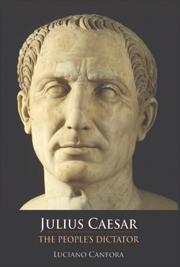Book contents
- Frontmatter
- Contents
- Translators' Note
- Acknowledgements
- Foreword
- PART I FROM SULLA TO CATILINE
- PART II FROM THE TRIUMVIRATE TO THE CONQUEST OF GAUL
- PART III THE LONG CIVIL WAR
- 16 Towards the Crisis
- 17 Striving after Tyranny?
- 18 Attacking the World with Five Cohorts
- 19 Caesar's ‘Programme’: In Search of Consensus
- 20 ‘Amicitia’
- 21 From the Rubicon to Pharsalus
- 22 Against Subversion
- 23 Alexandria
- 24 Caesar Saved by the Jews
- 25 From Syria to Zela
- 26 The Long Civil War
- 27 The Shoot of a Palm Tree: The Young Octavius Emerges
- 28 ‘Anticato’
- PART IV FROM THE CONSPIRACY TO THE TRIUMPH OF CAESARISM
- Chronology
- Bibliography
- Index
18 - Attacking the World with Five Cohorts
from PART III - THE LONG CIVIL WAR
Published online by Cambridge University Press: 05 August 2013
- Frontmatter
- Contents
- Translators' Note
- Acknowledgements
- Foreword
- PART I FROM SULLA TO CATILINE
- PART II FROM THE TRIUMVIRATE TO THE CONQUEST OF GAUL
- PART III THE LONG CIVIL WAR
- 16 Towards the Crisis
- 17 Striving after Tyranny?
- 18 Attacking the World with Five Cohorts
- 19 Caesar's ‘Programme’: In Search of Consensus
- 20 ‘Amicitia’
- 21 From the Rubicon to Pharsalus
- 22 Against Subversion
- 23 Alexandria
- 24 Caesar Saved by the Jews
- 25 From Syria to Zela
- 26 The Long Civil War
- 27 The Shoot of a Palm Tree: The Young Octavius Emerges
- 28 ‘Anticato’
- PART IV FROM THE CONSPIRACY TO THE TRIUMPH OF CAESARISM
- Chronology
- Bibliography
- Index
Summary
Le véritable auteur de la guerre n'est pas celui qui la déclare, mais celui qui la rend nécessaire.
MontesquieuOn the eve of civil war, in December 50 bc and the first week of January 49, illegality became official where one would least expect it: in the Senate. On 1 December Gaius Scribonius Curio, a tribune of the plebs whose support had been bought by Caesar, said openly what nearly everyone else was thinking:
that, if any person suffered from apprehension of Caesar's arms, and as the armed tyranny of Pompey was creating considerable alarm in the Forum, he would move that both leaders should give up arms and disband their armies. He held that by this means the state would be free and independent.
It was obvious that both powerful men threatened the republic and the freedom of its institutions, and this statement made it official in the place of greatest authority. Curio's proposal was accepted decisively, with 370 votes in favour and only 20 (or 22) against. Considering that everyone knew who he was and on which side he stood, it is clear from this episode how narrow was the ‘parliamentary’ base of the factio, now that it rested more and more on Pompey. It should not be forgotten either that the senators en masse were unstable and little inclined to factional alignment – it was not easy to predict their behaviour.
- Type
- Chapter
- Information
- Julius CaesarThe People's Dictator, pp. 141 - 149Publisher: Edinburgh University PressPrint publication year: 2007



